
Today, most people have more climate anxiety than before. It feels like the only reasonable response that our news feeds have been filled by concrete examples of the effects of climate change – from forest fires to typhoons. The feeling that the situation is acute has been further reinforced after the UN Climate Panel (IPCC) released a report on the effects of 1.5 ° C global warming compared to pre-industrial levels and the message that something must be done is clear.
Despite the relentless conclusion that an immediate transition must be carried out on an incredibly extensive scale, no one seems to be quite clear on what needs to be done and which actors are actually in power to drive change. Initiatives such as the carbon dioxide tax, green growth and vegetarian Mondays appear to be futile.
Actual solutions anchored in an understanding of the basic problems go a long way. When a discussion about air traffic’s climate impact and responsibility in environmental and sustainability issues conclude with tips on switching off the lights when leaving the room and “ leave the steak and choose the green beans instead ”it does not at all feel like we collectively put our finger on the solution and are heading in the right direction.
The world has probably never had so many climate initiatives in one year before; open seminars, vegetarian people, companies with sustainability ambitions and environmental demonstrations. Despite this, the’ climate impact is greater than it has ever been in the wealthiest parts of the world. We consume more than ever. Obviously, current strategies are not enough.
The problem lies in the lack of a fundamental insight: we cannot solve the climate crisis without limiting our economic system. Constant growth and continued growing production and consumption are the cornerstones of our economy, and not compatible with our climate ambitions. The nature of the economic system makes it logical with advertising that calls for more air travel and sales of products that quickly break down so that they need to be replaced with new ones. From an environmental perspective, we cannot afford to live within the framework of this system anymore.
A widespread position seems to be that the actors with the power to implement climate action are our politicians. It is quite possible that the climate goals could be achieved if all the world’s decision-makers decided to adopt a policy based on what is actually needed to be done. The question, however, is which politician would propose a direction that would have drastically negative effects on his country’s economy, and which parliament would pass it.
Understanding the seriousness of the situation is central to realizing that our current policy is difficult to reconcile with climate awareness. It stays within the framework of an economic system whose logic stands in direct opposition to ecological sustainability – at least as it seems today. The climate policy that countries conduct plays a huge role, of course. It also makes other traditional suggestions like individuals’ habits and name gatherings that put pressure on companies.
But unfortunately, they do not solve the fundamental problem: the system. Because of this, we have to start looking for answers elsewhere and among other actors. If we seriously mean that we want to stop exacerbating the effects of the climate crisis, we must prevent our system from continuing to run as usual. We must prioritize our climate at the expense of our economy.
Winston Smith’s analysis that if there is any hope, it lies with the people, is still relevant. Historically, popular resistance has played an important role in driving change that has been in opposition to strong economic and political interests – not least in labor law matters. As these types of movements tend to be less interconnected with the interests of the business community, they are an important player in working towards it. Citizens who organize themselves and make themselves cumbersome for continuing “business as usual” are the group that has the power for change in that they do not have to stay within what is economically rational in the way companies, politicians and consumers need to do. .
Obviously, it is very difficult to organize protests to the extent that it has a powerful impact – especially if you speculate on the possibility of a global movement. However, it is in any case only about organizational capacity and not an internal logical contradiction as is the case if you put all your faith in the current political and economic system. Initiatives such as Greta Thunberg’s school strike for the climate and the direct action group Ende Gelande’s occupations of lignite mines are examples of activism that shows that there are forces in society that want to resist.
It is high time to go from protest to resistance – from wishing for less emissions to physically stopping them. Perhaps this is the last hope to cling to stuck to. that the people in a system with strong incentives for continued production, consumption and transport eventually put a stop to themselves by being a brake pad that prevents everything from rolling on as usual.
The time to just go on a demonstration train must end. Political organizations must not stop at appealing a system to change itself. Although these actions help to calm one’s own concerns that nothing is being done, it must be used more effectively. The people have power and groups who want to turn climate anxiety into action are growing. It’s just joining.

Leave a Reply